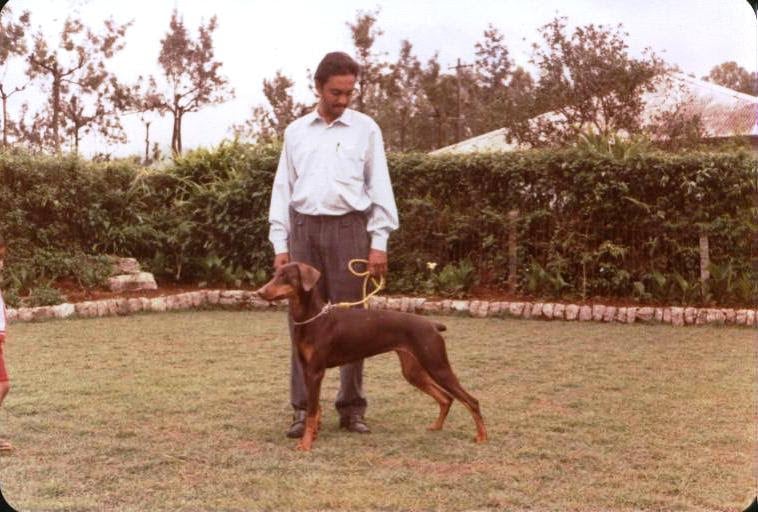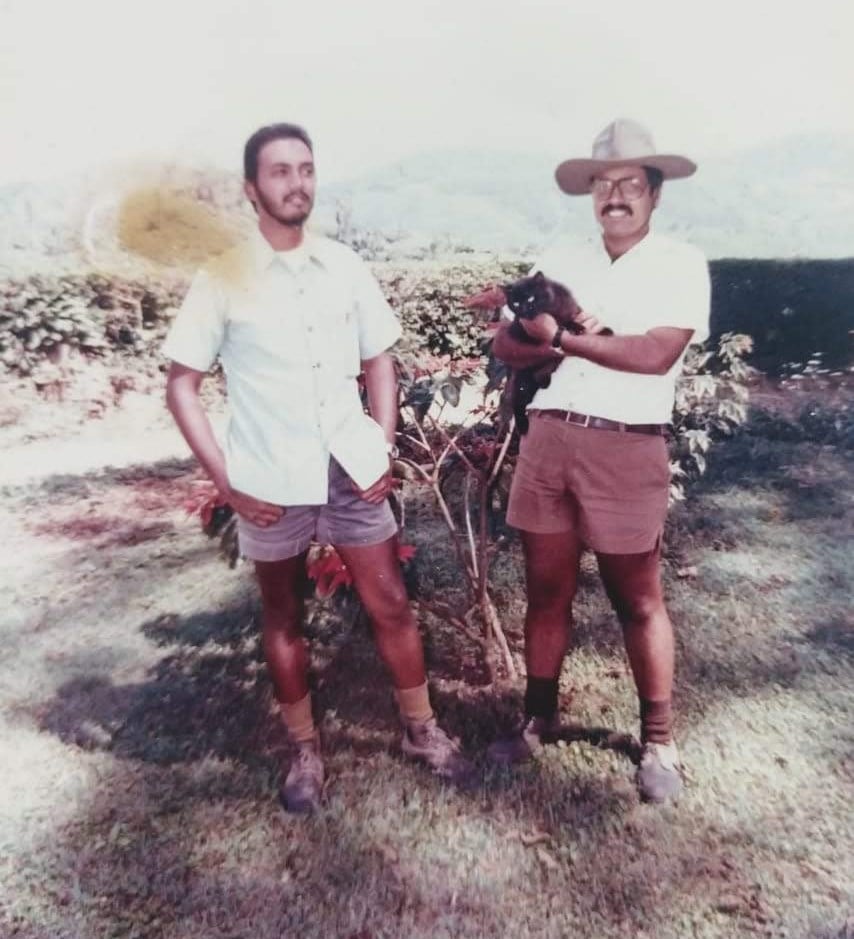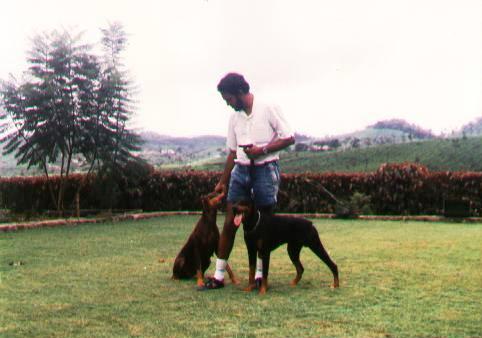
How to beat Goliath
Because size doesn’t matter
I have formulated 6 rules which I call David’s rules. These are for anyone facing the big one ...
I wish children didn’t grow up so quickly, that dogs lived longer…that coffee was free, and that more minds were open. ~ Kelly’s Treehouse.
Indeed, I wish for all those things but most of all that dogs lived longer. All through my childhood, youth, and all the way until I was 42 years old, I had dogs. Usually more than one. The last one I had was Bonnie, a beautiful, chocolate colored Doberman bitch who was a friend, companion, confidant, and who I miss every time I think of her.
Bonnie came to me in a very quaint way. It was 1983 and I had just begun my career in tea planting when the wife of our Managing Director, visited the Anamallais. When I met her, she asked me if I was happy and if I needed anything. I told her that the only thing I missed was having a dog. A couple of months later, I got a message from her that she had a puppy for me and that I should arrange to collect it. I was delighted. It was summer and intensely hot in Chennai, where the puppy was. So, I sent for one of the workers from the estate, Veeramuthu Josiyar (Jyotishi – Fortune Teller). Being a Jyotishi meant that he always did light work and others didn’t mind. I gave Veeramuthu a large plastic woven basket with a folded sheet in the bottom and gave him detailed instructions about how to bring the puppy. He had to take a bus from Murugalli Bazar to Valparai. Then take another bus to Coimbatore. Then a train to Chennai and then an auto rickshaw to the Managing Director’s house and after picking up the puppy, retrace his steps. For the return journey, I was so worried about the comfort of the puppy, that I booked an airconditioned coach seat for Veeramuthu on the Nilgiri Express from Chennai to Coimbatore. Two days later, Veeramuthu arrived safe and sound with the little puppy in the basket and said something to me, the shock and regret of which remain with me to this day. He said to me, “Dorai, thanks to your dog, I was able to ride in an airconditioned train. I never thought I would be able to do this in my life. I want to thank Dorai for this.” Out of respect, in our languages we almost never say, ‘You’, but instead we speak in third person. To say that I was mortified would be an understatement. The fact that what happened was not deliberate but because of my thoughtlessness, was no solace to me. I apologized to Veeramuthu, much to his surprise, setting off a torrent of counter apologies from him. But it drove home to me, very hard that every action of ours has consequences and just because I may not have done something intentionally didn’t mean that the consequences would be any different. Very powerful, though painful lesson. The long and short of it was love at first sight with the most expressive liquid eyes you could imagine in a chocolate face, long legs, very short docked tail, which meant that the whole little butt wagged, powered by an internal dynamo that worked 24×7.

I named her Bonnie. Bonnie stayed with me through my marriage, five estates, and three cities. She traveled with us by car, truck, train and in the cargo hold on an Indian Airlines plane, in a traveling cage, specially constructed for her. I had to tell the Captain that he had live cargo in the hold and so must keep the hold pressured and heated. Finally, in 1997, when we moved to America from Bangalore, Bonnie went to live with my dearest friend Bertie Suares on Burnside Estate in Kotagiri, where one winter morning, she passed away in her sleep, on the lawn, basking in the sun.
When Bonnie came into my life, I also had two cats. A Siamese called Choti Billi and a jet-black cat with green eyes called Brinjal. That rather strange name was given to her by a Spanish friend, Oriol Pujol, a Gestalt specialist who was visiting me. At meal times, Bonnie would sit on one side of my chair and the cats on the other. They maintained a cautious, cordial relationship based on the principal of ‘smoke the peace pipe, but keep the gunpowder dry’. Bonnie was a born lady. Polite, charming, and very friendly. But cats are cats. They dislike the arrogant and look down upon the humble. For my part, I stayed out of the politics of these relationships, as long as there was no murder and mayhem in the offing. There wasn’t. By the time Bonnie came into my life, I’d had many other dogs and had trained them for obedience, defense and tracking and I knew that training dogs begins with building a relationship of trust with the animal.

Some thoughts about dogs before we talk about training. Dogs are very intelligent. They have good memories which is what makes them trainable. They are pack animals who have total loyalty to the pack. Depending on the pack hierarchy, they can be dominant or recessive. Dogs are creatures of habit and like humans, old habits die hard. Dogs have highly developed senses of sight, hearing, and smell, which are not comparable to ours at all. Theirs are aeons ahead and I will tell you in a minute why you must never forget this. And finally, like us, dogs do things for their reasons, not ours. Training is about giving the dog a reason to obey you. That reason, can be fear or love. It is up to us to decide which one we want it to be. The results we get will depend on that. Even more finally, all the above is our understanding about dogs. Nobody ever consulted a dog about whether this is correct or not. It is good to keep this in mind when trying to speak like an expert. We aren’t and we will never be.
Dogs have been companions of humans from the earliest days of cave dwellers when the first dog (or wolf?) chose the warmth of the camp fire and eating what humans threw away, to living out in the cold and hunting for its meal. That doesn’t mean that dogs have lost their ability to hunt. Apart from breeds that have been bred for cosmetic purposes and are incapable of surviving on their own, any breed will go feral if it needs to. We have ample and tragic evidence from Ladakh (see the film ‘Khee’) where local ‘Indian pie dogs’ go feral in winter and form packs and hunt humans. It is good to remember this that any of the larger breeds which are generally classified as ‘Working dogs’, is more than capable of taking down a full-grown adult man on its own. In a pack, they can take down more than that. Respect is a good thing to have in any relationship, including in our relationship with our pets.
I am introducing a familiar word here, ‘pet’. Remember that to you, the dog is a pet. The dog, however, doesn’t understand what a ‘pet’ is. To the dog, you are one of two things, the pack leader, or a pack-mate. If it sees you as a pack leader, it will obey you. If it sees you as a pack-mate, it will be friendly but may obey you or not and may even try to dominate you. Size plays a big role in the animal world. Big is better than small. And so a big dog is more likely to give you a hard time becoming obedient that one of the smaller breeds. Also, since dog packs are led by Alpha males, a big male will fight you more than a female, in the initial phase of training. He will try to dominate you and if he succeeds, then you will never train him. If you raised the dog as a puppy, you will most likely, not have these issues because the dog bonds with you as the pack leader (mother). That has nothing to do with your gender. For the puppy, anyone feeding him is his ‘mother’. But if, like I used to do, you want to train grown animals, you will need to establish your dominance if you want the dog to obey. Some people ask if certain breeds are more trainable than others. Yes, they are. However, in the end it is more about how good a trainer you are and less about the so-called trainability of the breed. Every breed can be trained if you know how.
So, how do you begin training? You begin by establishing a relationship. As I mentioned earlier, the relationship is based on fear or love. I have always preferred the latter because that leads to trust and loyalty literally to the end. It takes longer than fear, but it is the best guarantee of success. I have known trainers who to make money by speeding up their throughput of dogs, starve and beat a dog into submission, literally to the point where when the dog sees the trainer, it whimpers and urinates in terror. It is not a good sight. And in my view that is a horrible way to earn a living.

Dogs are pack animals and loyalty comes naturally to them. It is a survival thing. Loyalty to the pack is rewarded by the pack’s loyalty to the animal which it critical to survival. The trainer’s task is to take the place of the pack leader. There is no alternative to this. If you want to train the dog, it must see you as the leader. We get there by a fine balance of two things, setting boundaries and rewarding obedience. In this, the fact that dogs are highly intelligent, creatures of habit and highly sensitive, all play a part. Dogs, like children, test boundaries. The dog wants to see how serious you are about the boundary. Once it realizes that the boundary is non-negotiable, it will obey. Secondly, dogs don’t understand your language and words. People talk long sentences and all kinds of endearments to dogs and will swear that the dog understands them. What the dog is reacting to is the tone of the voice. When training, short commands, given in the same tone every time, is the fastest way to train the dog. It doesn’t matter what you say. You could talk in Mandarin or Zulu or simply making a sound. To the dog, it is a sound, which means whatever you want it to mean. He will respond to that as long as you say the same thing in the same way every time.
What also happens which most of us don’t realize is that the dog is not only listening to your voice, but to the underlying intonation, the sad, glad, bad, mad tone. The tension, the trembling, the joy, the fear, the whatever it is that you are speaking with. He is looking at your face and imprinting your expression and linking it to the tone of the command. He is looking at and is sensitive to your body language, the way you hold your hand, the way you put more weight on one leg than on the other, the way you incline your head. As I mentioned, the dog is far more sensitive, alert, and intent than we can ever imagine and he is bringing it all to bear in the training. For you it is just one command, like ‘heel’, or ‘sit’, or ‘stay’, or other commands depending on what you are training the dog for. But for the dog, he is responding to the entire combination of voice, tone, facial expression and body language. You may not be aware of all these things, but the dog is. That is why I say that to train dogs is to discover yourself.
Sometimes, when training dogs for other people, you complete the training and call the owner. You put the dog through its paces and the owner is delighted and takes the dog home. You think that all is well, until you get a call the next day saying that the dog is not responding to any command and has forgotten the training. You ask the owner to bring the dog back. When the dog comes to you, it behaves perfectly and does everything that it was trained to do. But when it goes back home, it doesn’t. The problem is with the difference in communication from the dog’s perspective between the way you commanded it and way the owner does. After the first time this happened, I used to insist that the owner spend a day or two with me and the dog and learn to command it in the way it had been trained for before taking it home. We never had any comebacks after that.
Different breeds act differently to the same commands. For a Doberman, everything is a test. Dobermans tend to be highly strung and will obey instantly and if they fail in their effort they get upset. For Labradors and Golden Retrievers, everything is a game and the dog has great fun whether he is retrieving a duck in a shoot, or a ball that you threw for him to fetch or he is pulling down an attacker with a knife. It is all a game. What I have said above is generally about the breed. But in the same breed, individual dogs have their own characters and so it is important to get to know your dog. I am a great believer in spending as much time as you can with the dog that you are training and to observe it closely and intently and notice how it behaves in different situations. This will give you an understanding of the animal and help you to understand how it responds to training and what you need to do to help it to learn fast. Consistency is key. Same command in the same way, every time. That is why you must be self-aware. Reward obedience. Ignore disobedience but repeat the command until you get obedience. Always end on success. Don’t punish the animal. You don’t want him to fear you but to obey you because he wants to please you. When he is rewarded for obedience, it encourages him, and he will do it every time. Finally, and very importantly, don’t tire the animal out. Once the training session is over, let him run free. Feed and water him and leave him to do whatever he wants to do. You want him to look forward to the training and not to fear it.
The biggest benefit of having a dog from my perspective is the companionship that the dog provides, of non-judgmental, unconditional love. For the dog, you are the most precious, beautiful, and admirable person in the world to whom the dog dedicates himself lifelong. No matter that in the eyes of the world you are poor, ignorant, fat, or thin, your socks stink, and you have warts, for your dog, you are the absolute best thing that happened to him. There is nobody else in the world and in your life, who will be as loyal to you as your dog. And I mean that without any exceptions. Treat a dog with love and patience and it will enrich your life and give you memories which will make you smile, years after the dog has died.
One last word, in many cases, dogs have to be euthanized because they have some painful incurable ailment in their old age. Many owners take the dog to the vet and hand it over and leave as they don’t want to see the dog dying. Never do that. For the dog, you are its life. In his last moments he wants you to be by his side, maybe with his head in your lap as he breathes his last. The vet will sedate him, and he will not feel any pain, but to leave him in the hands of strangers only because you tell yourself that you can’t bear to see the end is extremely selfish. Stay with him. Talk to him. Stroke his head. Be with him and let him look at your face as his eyes close. He lived for you. Now you stay by his side as he goes on his last journey. This is the most painful thing about having dogs, but it is inescapable. Be faithful to the one who was always faithful to you.
As I said, I wish dogs lived longer.
Please log in to leave a comment
Loading comments...

I have formulated 6 rules which I call David’s rules. These are for anyone facing the big one ...

One of my friends who comes from ...
I have said this a million times, if I have said it once – the three crimes committed on society with society’s blessing are: Commerci...